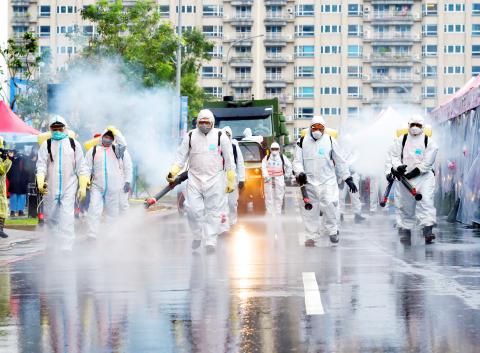The nation’s first large-scale emergency drill to test disease prevention and control measures for a possible community transmission of COVID-19 was yesterday held in Yangbei Community (央北社區) in New Taipei City’s Sindian District (新店).
New Taipei City Mayor Hou You-yi (侯友宜) served as the drill commander, while Minister of Health and Welfare Chen Shih-chung (陳時中) — who heads the Central Epidemic Command Center (CECC) — and CECC advisory specialist panel convener Chang Shan-chwen (張上淳) attended the one-and-a-half-hour operation.
A total of 450 people, including city government officials, healthcare workers, military personnel and community volunteers, participated in the drill.

Photo: Fang Pin-chao, Taipei Times
Four scenarios were simulated, with the first being “disease prevention promotion” before a community infection and the second being “some sporadic confirmed cases.”
The third was a “virus transmission in a single community” scenario, in which enhanced community entry-exit controls would be implemented, and the city’s Department of Social Welfare and Animal Protection Office would shelter young children or pets in controlled areas if their parents or owners are infected by the virus.
The fourth scenario was a “large-scale community spread” — defined as more than 3,000 confirmed cases — in which an advance command post would be set up in the community with the most severe outbreak, and a screening hospital would be designated to assess patients and treat them, while Far Eastern Memorial Hospital in Banciao District (板橋) would take in the most severe cases.
The city can hospitalize a maximum of 678 COVID-19 patients, but aims to expand its capacity to at least 1,000 beds, Hou said, adding that the city government has also chosen isolation centers that can quarantine up to 2,000 patients with mild symptoms if a large-scale community transmission occurs.
Medical personnel from 17 New Taipei City hospital branches attended the drill, and simulated assessing patients’ conditions and taking people who are under home quarantine to designated hospitals, as well as clearing out hospital beds in the New Taipei City Hospital’s Sanchong Branch and taking patients to other hospitals.
Military personnel simulated a large-scale disinfection scenario by spraying disinfectant in the streets and public spaces.
Hou said that if the COVID-19 situation gets worse, decisions such as whether commercial activity or schools should be suspended, or whether traffic controls should be implemented, would have to be made by the central government.
A joint drill, including the central government and four cities and counties in northern Taiwan, could be considered as a next step, he added.
Chen praised the drill as “very realistic” and a demonstration of “advance arrangement,” saying that if all local governments show the same preparation, the CECC would be more at ease.
The COVID-19 situation in Europe is worrying, because it shows how a little carelessness can cause the situation in a developed region to worsen rapidly, he said, adding that proactive measures between agencies are important, and that people should remain aware, but not panic.

CROSS-STRAIT COLLABORATION: The new KMT chairwoman expressed interest in meeting the Chinese president from the start, but she’ll have to pay to get in Beijing allegedly agreed to let Chinese Nationalist Party (KMT) Chairwoman Cheng Li-wun (鄭麗文) meet with Chinese President Xi Jinping (習近平) around the Lunar New Year holiday next year on three conditions, including that the KMT block Taiwan’s arms purchases, a source said yesterday. Cheng has expressed interest in meeting Xi since she won the KMT’s chairmanship election in October. A source, speaking on condition of anonymity, said a consensus on a meeting was allegedly reached after two KMT vice chairmen visited China’s Taiwan Affairs Office Director Song Tao (宋濤) in China last month. Beijing allegedly gave the KMT three conditions it had to

STAYING ALERT: China this week deployed its largest maritime show of force to date in the region, prompting concern in Taipei and Tokyo, which Beijing has brushed off Deterring conflict over Taiwan is a priority, the White House said in its National Security Strategy published yesterday, which also called on Japan and South Korea to increase their defense spending to help protect the first island chain. Taiwan is strategically positioned between Northeast and Southeast Asia, and provides direct access to the second island chain, with one-third of global shipping passing through the South China Sea, the report said. Given the implications for the US economy, along with Taiwan’s dominance in semiconductors, “deterring a conflict over Taiwan, ideally by preserving military overmatch, is a priority,” it said. However, the strategy also reiterated

‘BALANCE OF POWER’: Hegseth said that the US did not want to ‘strangle’ China, but to ensure that none of Washington’s allies would be vulnerable to military aggression Washington has no intention of changing the “status quo” in the Taiwan Strait, US Secretary of Defense Pete Hegseth said on Saturday, adding that one of the US military’s main priorities is to deter China “through strength, not through confrontation.” Speaking at the annual Reagan National Defense Forum in Simi Valley, California, Hegseth outlined the US Department of Defense’s priorities under US President Donald Trump. “First, defending the US homeland and our hemisphere. Second, deterring China through strength, not confrontation. Third, increased burden sharing for us, allies and partners. And fourth, supercharging the US defense industrial base,” he said. US-China relations under

The Chien Feng IV (勁蜂, Mighty Hornet) loitering munition is on track to enter flight tests next month in connection with potential adoption by Taiwanese and US armed forces, a government source said yesterday. The kamikaze drone, which boasts a range of 1,000km, debuted at the Taipei Aerospace and Defense Technology Exhibition in September, the official said on condition of anonymity. The Chungshan Institute of Science and Technology and US-based Kratos Defense jointly developed the platform by leveraging the engine and airframe of the latter’s MQM-178 Firejet target drone, they said. The uncrewed aerial vehicle is designed to utilize an artificial intelligence computer